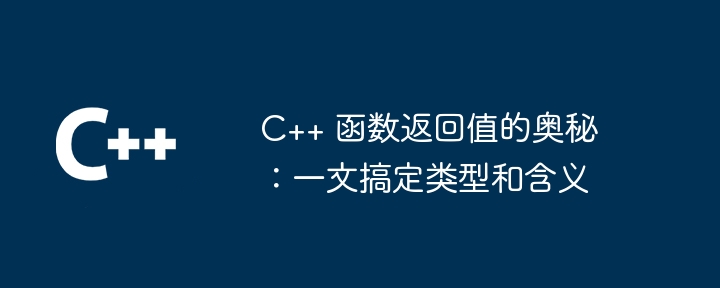
C Function return value types can be divided into void, basic types, composite types and pointer types, and their meanings include success/failure flags, results and object references. Practical examples show how functions returning basic types, composite types, and pointer types work.

Introduction
In C, Function return value is an important concept, which determines the execution flow of the program after calling the function. This article will delve into the types and meanings of C function return values, and help you thoroughly understand this concept through practical cases.
Function return value type
The function return value type refers to the data type of the value returned after the function is called. In C, function return value types can be the following:
Function return value meaning
In addition to the type, the function return value also has the following meaning:
fopen()function returns a file pointer, which is a non-null pointer if the file is opened successfully; otherwise, it isNULL.sqrt()function returns a floating point number representing the square root of its input value.Practical cases
In order to better understand the function return value, let us look at a few practical cases:
Example 1: Return basic type
int max(int a, int b) { return a > b ? a : b; }
This function returns the larger value of a and b.
Example 2: Returning a composite type
struct Point { int x, y; }; Point createPoint(int x, int y) { return {x, y}; // 初始化结构并返回 }
This function creates aPointobject and returns a reference to it.
Example 3: Return pointer type
int* findMax(int* arr, int n) { int* maxPtr = arr; // 指针指向数组第一个元素 for (int i = 1; i < n; i++) { if (arr[i] > *maxPtr) { maxPtr = &arr[i]; // 指针更新为指向最大值的元素 } } return maxPtr; }
This function returns a pointer to the maximum value in the array.
Conclusion
Through the discussion in this article, you should have fully understood the type and meaning of the C function return value. With the help of practical cases, you can also easily master the application of function return values. Remember, function return values are a crucial concept in C that enhance program flexibility and make your code more readable.
The above is the detailed content of The secret of C++ function return value: get the type and meaning in one article. For more information, please follow other related articles on the PHP Chinese website!
 What is the return value of the function
What is the return value of the function What are the differences between c++ and c language
What are the differences between c++ and c language Recommended learning order for c++ and python
Recommended learning order for c++ and python Cost-effectiveness analysis of learning python and c++
Cost-effectiveness analysis of learning python and c++ Is c language the same as c++?
Is c language the same as c++? Which is better to learn first, c language or c++?
Which is better to learn first, c language or c++? The difference and connection between c language and c++
The difference and connection between c language and c++ C++ software Chinese change tutorial
C++ software Chinese change tutorial



